
Initiation and Overview
The Department of History in our college is as old as the college. It started its journey along with the foundation of the college in 1961 with a handful of students and dedicated teachers. Our department today ranks among one of the best in the colleges affiliated with the West Bengal State University. The department follows the CBCS semester system, as mandated by the UGC and the curriculum strictly adheres to the one prescribed by West Bengal State University for its affiliating colleges. The department offers undergraduate courses in history in both Honours and general stream.
Vision and Outlook
Swami Vivekananda expressed his dream of founding a Women’s Math in a letter to his brother disciple, Swami Shivananda in 1894 from America. Ramakrishna Sarada Mission Vivekananda Vidyabhavan (established 1961) was the first educational institution started by the Ramakrishna Sarada Mission. What began as a humble effort to carry out Swami Vivekananda’s vision , housed in a one-roomed makeshift structure with thirty one students and a handful of young, idealistic and enthusiastic teachers and monastic members, has resulted in one of the premier women’s institutions of the state, and ranks among the best institutions under the West Bengal State University. The Department of History follows the principles and visions of Swami Vivekananda in empowering women through education. It is our attempt to inculcate among our students the pride in being carrier of great heritage through an objective teaching of history of India and the world as laid out in the University syllabus.
METHODS OF TEACHING
The academic vivacity is clearly reflected in class room environment where the teachers have been able to inculcate a critical spirit and outlook among the young girls. The teachers recognize the extremely challenging backgrounds of the students. Apart from traditional classroom lectures or the chalk and talk method, the Department uses ICT based classes and audio-visual aids, like Power-point presentations, to enhance learning interests. The Department also organizes educational tours and other extension activities every year to imbibe a better understanding of philosophical, psychological, sociological and research methodological foundation of the subject. Regular assessments through unit tests and class-tests and end of the semester mock-exams ensure that the students are well prepared for their final end-semester examinations. Departmental and inter disciplinary seminars, student projects, extension lectures, tours to places of historical importance see a 100% involvement and participation of both teachers and students.
The enthusiastic bunch of students and their cooperation make possible many successful programmes that the department undertakes from time to time. Many of our students are first generation learners who make an honest effort towards self-reliance by engaging themselves in small jobs.
INFRASTRUCTURE
Our department has three classrooms. One classroom has a smart television to facilitate audio visual teaching with the help of laptop. All the classrooms have Wi-Fi connectivity.
Email : history@rksmvv.ac.in
NEP Syllabus
https://wbsu.ac.in/web/wp-content/uploads/2024/01/History-Syllabus-NEP-Syllabus.pdf
CBCS Syllabus
https://wbsu.ac.in/web/Syllabus/UG%20Syllabus/history-honours-cbcs-draft-syllabus.pdf
https://wbsu.ac.in/web/wp-content/uploads/2022/03/history-general-cbcs-draft-syllabus-Corrected-1.pdf
Programme Outcome for Bachelor of Arts
A graduate student in arts/social sciences/humanities shall be
PO1: Communication Skills: Confident to speak, write, read, listen and understand the English language and one or more Indian languages. Relate the ideas, knowledge, books, and people. Think and decide rationally, and adopt technology and electronic/print media in disseminating thoughts, facts and realities.
PO2: Social responsibility: Develop an obligation to act for the benefit of society at large. Cultivate the responsibility to maintain a balance between the economy and the ecosystems. Nurture a moral obligation to minimize the adverse effect on those immediately around them.
PO3: Critical, logical and rational thinking: Acquire the ability for objective, rational, skeptical, logical, and unbiased analysis of factual evidences to form a judgment or conclusion. Enhance the process of rational thinking, problem solving and analytical evaluation from different perspectives.
PO4: Enlightened and effective Citizenship: Cultivate progressive citizenship for a knowledge society for peace and prosperity of nations and the world. Develop clear, rational and progressive thinking. Participate in decision-making concerning the society and upholding national development, integrity, unity and fraternity.
PO5: Values and Ethics: Recognize the importance, worth and usefulness of principles and standards of behaviour and moral dimensions of one’s own decisions and judgements. Be aware of various aspects of social responsibility through social, outreach, and cultural activities during the programme. Shape a personality which understands and appreciates religious and cultural diversity and plurality.
PO6: Sustainable development: Understand, organize and promote the principle of human development goals by sustaining the ability of natural systems, natural resources and ecosystem services upon which the economy and society depends.
PO7: Life-long process of Learning: Cultivate the proficiency to engage in independent, life-long and progressive learning abilities in the broadest context of changing socio-politico-economic-cultural and technological scenario.
PO8: Employment Skills: Be prepared for employment in various fields by developing reading, writing and comprehension skills which make the students fit and eligible for jobs in the government and non-government sectors. A broad spectrum study of various subjects helps the students compete in various examinations for employment after graduation.
Programme Specific Outcomes:
Paper Name and Course Outcomes:
CC1: History of India-I (From Earliest Times to c.300 BCE) [Semester-1]
CC2: Social Formations and the Cultural Patterns of the Ancient World [Semester-1]
CC3: History of India- II (From c.300BCE – 750CE) [Semester-2]
CC4: Social Formations & the Cultural Patterns of the Medieval World [Semester-2]
Assessing the social hierarchy dominated by male slave owning Patricians
CC5: History of India -III (750 CE-1206 CE) [Semester-3]
CC6: Rise of the Modern West- I [Semester-3]
CC7: History of India IV (1206 CE– 1526 CE) [Semester-3]
CC 8: Rise of the Modern West-II [Semester-4]
CC 9: History of India-V (1526 CE-1757 CE) [Semester-4]
CC10: History of India-VI (1757 CE-1857 CE) [Semester-4]
CC 11: History of Modern Europe (1789 CE– 1919 CE) [Semester-5]
CC12: History of India VII (1858 CE-1947CE) [Semester-5]
CC 13: History of India VIII (India Since 1947 CE) [Semester-6]
CC 14: Trends in World Politics (1919CE-2001 CE) [Semester-6]
DSE 1 Paper I: Aspects of the History of Modern South East Asia I [Semester-5]
DSE-2: Aspects of the History of Modern South East Asia II [Semester-5]
DSE 3: History of Modern East Asia I (1839 CE-1919 CE) [Semester-6]
DSE 5: History of Modern East Asia II (1919 CE-1939 CE [Semester-6]
CO-PSO Mapping (CBCS)
After completion of the course students will be able to relate their knowledge level by mapping the Course Outcomes with Programme Specific Outcomes:
| Core Course | CO | Knowledge Level
Bloom’s Taxonomy |
PSO Mapping |
| CC1 | Critically review the sources, and their significance in knowing the historical antiquity and chronology of ancient India.
Classify the life of prehistoric peoples of the Neolithic and Chalcolithic ages; Differentiate between the urban civilisation of the Indus Valley culture and the subsequent Vedic and post-Vedic civilisations down to c. 300 BCE. Explore the emergence of the Sangam literature and identify the distinct cultural patterns of the people in south India.
|
Review, classify, differentiate, explore, identify. | 1, 3, 4,5 |
| CC2 | emphasises the study of human evolution from pre-historic hunter-gatherers through phases like Palaeolithic, Mesolithic to the Neolithic cultures.
Examine and contrast the different theories regarding the evolution of mankind especially the debates on the advent of Iron Age. Distinguish and categorize the different forms of stratified society through investigating the formation and dynamics of polis and societies dominated by patriarchy and temples. The study of the ancient world of Mesopotamia and Greece: interpreting their socio-economic patterns and specificities.
|
Study, Examine, Contrast, Distinguish, Categorize, Investigate, Interpret. | 2, 3. 4, 5 |
| CC3 | Interpreting the formation of a centralised state under the Mauryas, analysing the importance of Ashokan political ideology of dhamma.
Discussing the emergence of the Guptas and their decline. Evaluating the “Golden Age”. Assessing the emergence of Agrahara system and the notion of Indian feudalism
|
Interpret, Analyse, Discuss, Evaluate, Assess | 1, 3, 4, 5 |
| CC4 | Reviewing the different nuances of classical Rome from earliest period through Republic to Empire and examining its fall related to the defeat of territories and consequent loss of slaves.
Examining the dynamics of transition from Slave mode to Feudal mode of production. Assessing the social hierarchy dominated by male slave owning Patricians Analysing the feudal economy and its crises; rise of Papacy, urbanisation, trade, cities and Universities till the Crusades. Exploring the emergence of Islam, Caliphate state and Abbasid political and cultural developments. Studying the distinctiveness of the Islamic culture, society and political developments and differentiate them from the other early medieval political-economic-social formations
|
Review, Examine, Assess, Analyse, Explore, Study, Differentiate. | 1,2,3,4,5 |
| CC5 | Assessing the idea of early medieval period; agrarian structure; social order; trade and urbanisation. Exploring the debates on “Indian Feudalism”
Classifying and differentiating the political structures of the Rajputs, Cholas. Discussing the Tripartite Struggle and explaining the legitimization of kingship. Identifying the factors behind coming the Arabs and the Sultans from Ghazni and Ghore and explaining their impact on the political scenario of India. Reviewing the emergence of regional styles in art and architecture, religion and literature
|
Assess, Explore, Classify, Differentiate, Explain. | 2,3,4, 5 |
| CC6 | This Course describes in details, the processes and debates on transition from feudalism to capitalism impacting economy, society, political formations and cultural.
Assess the different debates regarding the economic aspect of how Early Modern Europe was transformed, and classify the contrast in society during the transition from feudalism to capitalism. Project the 16th Century issues of agricultural transition leading to new phenomena as Enclosure, Price Revolution. Identify the concept of individualism and illustrate the characteristics of Renaissance and Reformation. Determine the nature of the evolution of the modern European state formations Evaluate the significance of geographical discoveries in bringing about the transition in society
|
Describe, Detail, Assess, Transform, Classify, Contrast, Project, Identify, Illustrate, Determine, Evaluate | 1, 2, 3, 4, 5 |
| CC7 | A crucial course for the study of the Delhi Sultanate, its political structure, society and economy.
Investigate the paradigm shift from earlier central Asian invasions for plunder to the establishment of a new socio-political structure Differentiate the features of the Ghorid and Ghaznavid empires. Characterise the Third Urbanization and new technologies of production. Acquiring a wide knowledge of syncretic movements, and extrapolate ideologies and social mobilisations by breaking down of the caste system while retaining slavery as a new social hierarchy.
|
Study, Investigate, Differentiate, Characterise, Acquire, Extrapolate | 1, 3, 4,5 |
| CC8 | Detail the intricacies in the process of socio-economic change brought about in Transition Europe
Interpret the essential aspects of English Revolution, Scientific Revolution Explain in detail the process of the American Revolution and examine the ideology behind it Analyse Lockean political thought and interpret the concept of modern liberal nation state and citizenship.
|
Detail, Process, Interpret, Explain, Examine, Analyse | 1, 3, 5 |
| CC9 | Picture graphically the establishment and significance of the Mughal rule, its decline, and the coming of the British and battle of Plassey form the thrust of the paper.
Investigate the reasons behind Mughal success and how they led to socio-political, cultural and economic changes. Illustrate the improvisation made by Akbar in the current revenue systems and evaluate the mansabdari and jagirdari systems. Elaborate upon Akbar’s Din-i-Ilahi as a religious, political and social strategy. Generate an understanding of Mugha court politics, jagirdari crisis and contrast them with the early colonial intrusions in India with special reference to Bengal.
|
Picture Graphically, Investigate, Illustrate, Evaluate, Elaborate, Generate, Contrast. | 2,3, 5 |
| CC10 | Generate an understanding of the ideological defence of the British
rule in India, and analyse its constitutional, socio-economic, cultural reforms and resistance movements till the outbreak of the Revolt of 1857. Review and reinterpret Mughal decline and relate it to the fall of major empires in the world. Interpret the 18th century history and the point out the transition of India to the modern period with the coming of the European powers Appraise the significance of the peasant rebellions leading up to 1857 uprising, and determine its causes and aftermath. Develop an understanding of colonial economy and ascertain the growth of nationalism. Study socio religious reform movements in the 19th century and corelate them as a conflict between prevalent Brahminical/indigenous ideologies and colonial patriarchy and communalism.
|
Generate, Analyse, Review, Reinterpret, Relate, Interpret, Point out, Appraise, Determine, Develop, Study, Corelate. | 1,2,3, 4, 5 |
| CC11 | Explore the complex forces come together in the making of revolutions,
Summarise how democratic institutions and egalitarian ideologies of modern times were shaped in a particular revolutionary context, Contrast forces of conservativism against any revolutionary change Review how revolutions themselves can give rise to semi-conservative capitalist modernising forces like Bonapartism Examine how the World after the French revolution was motivated by the ideology of nationalism, beginning with Germany and Italy. Formulate an idea about the varied concepts of imperialism, militarism and trace how it led to the first global war Demonstrate the impact of First World War and classify the social and economic changes that took place in Europe in the 19th and 20th centuries
|
Examine, Explore Contrast, Summarise, Review, Formulate, Trace. | 3, 5 |
| CC12 | Evaluate the main currents of anti-colonial struggles against British imperialism, criticise the rise of separatism and fundamentalism leading to Indian Independence in 1947 and Partition.
Explore the long and complex historiography of Indian nationalism Critique the notions of colonialism Assess the background to partition and examine the roles of the Indian National Congress, Hindu Mahasabha and Muslim League. Summarise the growth mature colonialism and correspond its impact on the socio-economic conditions of the people. Discuss communal politics, rate the imperialist policy of “divide and rule” and expose how it broke the unity of India in the freedom struggle.
|
Evaluate, Criticise, Explore, Critique, Assess, Examine. | 1, 3, 4, 5 |
| CC13 | Examine post-independence India as a distinct historical unit
Review the challenges faced immediately upon independence and incorporate within the same, national integration, social justice, mass migration and rehabilitation Observe the problems of communalism, communal riots and contrast with it the establishment of a secular polity Describe the foundation and functioning of a democratic system, characterise multiparty politics and a partially federal structure. Reinterpret the gender question, examine role of science and education in social modernisation. Specify economic challenges and planning. Criticise the role and vision of Jawaharlal Nehru and B. R. Ambedkar |
Examine, Review, Incorporate, Observe, Contrast, Describe, Characterise, Reinterpret, Specify, Criticise. | 2,3,4, 5 |
| CC14 | Examine European history in the period between World War I and World War II and corelate the contest of communist revolution, contrast it with the rise of fascism
Investigate the Great Depression Articulate the theories of the Cold War and assess the struggle between two ideologically varying camps vying for the domination of the world Discuss the emergence of the Third World and corelate the movements related to the same Characterise the Unipolar World; explain the disintegration of the Soviet Bloc and of the USSR Outline the features of Globalisation and show its impact on world politics Assess the significance of terrorism as a world phenomenon in the modern world |
Assess, Outline, Show, Examine, Correlate, Contrast, Investigate, Articulate, Discuss, Characterise, Explain. | 1,2,3,5 |
| DSE1 | Enumerate what constitutes South East Asia
Explain polity, economy, society and culture in the different nations of South East Asia and contrast them in the respective pre- colonial and colonial setup. Determine why South East is an important area of historical inquiry Ascertain the nature of colonialism and identify the rise of nationalism in the different South East Asian nations Trace origins of different national liberation movements
|
Enumerate, Explain, Contrast, Determine, Ascertain, Identify, Trace. | 1,2,3, 5 |
| DSE2 | Examine the impact of the colonialism on the society, economy and polity of twentieth century South East Asia
Diagnose the different resistance movements against colonialism Discuss the emergence of independent nation states Interpolate decolonisation, Cold War politics and discuss the regional cooperation initiatives with reference ASA, ASEAN, and NAM
|
Examine, Diagnose, Discuss, interpolate | 1,2,3,4,5 |
| DSE4 | Summarise the history of China and Japan between 1839-1919 with special reference to the debate on the coming of modernity
Discuss peasant rebellions in China and analyse their aims and impact Define the rise of political parties and interpret their ideologies Illustrate the Meiji Revolution and Restoration of Imperial Rule and distinguish them from the Chinese imperial model Analyse Japanese modernisation and expansionism, evaluate the Sino-Japanese War and the Russo-Japanese War; and indicate the significance of Japanese participation in World War I.
|
Summarise, Discuss, Analyse, Define, Interpret, Illustrate, Evaluate, Indicate | 1,2,3,5 |
| DSE5 | Indicate the difficulties of Republican China and Sun Yat Sen’s bid for a fresh revolution
Appraise cultural radicalism and the May 4 Movement Sketch the emergence of Communism and discuss the collaboration and conflict between Communism and Nationalism in the success of the CCP Review the political, economic and social modernisation in Japan Outline the growth of industrialisation in the state in Japan. Summarise the relationship between Japanese militarism and imperialism |
Indicate, Appraise, Sketch, Discuss | 1,2,3,5 |
PO- CO Matrix: CBCS
| PO1 | PO2 | PO3 | PO4 | PO5 | PO6 | PO7 | PO8 | |
| CO1 | ✔ | ✔
|
✔ | ✔ | ||||
| CO2 | ✔ | ✔
|
✔ | ✔ | ✔ |
|
✔ | |
| CO3 | ✔ | ✔ | ✔
|
✔ | ✔
|
✔ | ||
| CO4 | ✔ | ✔ | ✔
|
✔ | ✔ |
|
✔ | |
| CO5 | ✔ | ✔ | ✔
|
|
✔
|
✔
|
✔ | |
| CO6 | ✔ | ✔ | ✔
|
✔
|
✔
|
✔
|
✔
|
✔ |
| CO7 | ✔ | ✔ | ✔
|
✔
|
✔
|
✔
|
|
✔ |
| CO8 | ✔ | ✔ | ✔
|
✔
|
✔ | ✔
|
✔
|
✔ |
| CO9 | ✔ | ✔ | ✔
|
✔
|
✔
|
✔ | ||
| CO10 | ✔ | ✔ | ✔
|
✔
|
✔
|
✔ | ||
| CO11 | ✔ | ✔ | ✔
|
✔
|
✔ | ✔ | ✔ | |
| CO12 | ✔ | ✔ | ✔
|
✔
|
✔
|
✔ | ||
| CO13 | ✔ | ✔ | ✔
|
✔
|
✔
|
✔
|
✔ | |
| CO14 | ✔ | ✔ | ✔
|
✔ | ✔
|
✔ | ||
| CODSE1 | ✔ | ✔ | ✔
|
✔
|
✔ | ✔ | ||
| CODSE2 | ✔ | ✔ | ✔
|
✔ | ✔ | ✔
|
✔ | ✔ |
| CODSE4 | ✔ | ✔ | ✔
|
✔
|
✔ | ✔
|
✔ | |
| CODSE5 | ✔ | ✔ | ✔
|
✔
|
✔ | ✔ | ✔
|
✔ |
Major (DSC)
DS-1: History of India-I (From Earliest Times to c.300 BCE)
CO 1
Major (DSC)
DS-2: Aspects of Ancient World History
CO-PSO Mapping (NEP)
After completion of the course students will be able to relate their knowledge level by mapping the Course Outcomes with Programme Specific Outcomes:
| Core Course | CO | Knowledge Level
Bloom’s Taxonomy |
PSO Mapping |
| Semester I
DSE 1 |
Cultivate knowledge about ancient Indian history
Measure the significance of literary and archaeological sources in studying history Read about the antiquity of Indian history Evaluate the chronology of Indian history Describe in detail the Indus Valley Civilisation, clearly analyse the Vedic civilization down to the second phase of urbanisation in 6th BCE Point out the settlement patterns, and figure out the political, social, economic, and cultural developments in North and Central India and the Deccan up to 300 BCE. Justify the importance of the use of iron, spread of agriculture and second urbanisation in India Analyse the significance of sixth century BCE and depict it as a period of great religious upheaval in India, as an age of intellectual ferment that saw the emergence of numerous religious sects like Buddhism and Jainism.
|
Cultivate, Measure, Read, Evaluate, Describe, Analyse,
Point out, Figure out, Justify, Depict |
2, 3, 4,5 |
| Semester II
DSE 2 |
Study human evolution from pre-historic hunter-gatherers through phases like Palaeolithic, Mesolithic cultures to the Food-producers
Discuss the significance of Mesolithic and Neolithic cultures. Formulate adequate idea about the different theories regarding the evolution of mankind Identify the factors behind the advent of iron and discuss the rise of different nomadic groups Develop an understanding about the ancient world especially Mesopotamia, Greece and Rome Indicate the different nuances of ancient classical period of the foundation of Rome where mythology is substantiated by archaeology Acquire knowledge of evolution from Republic to Empire and its decline related to the defeat of territories and consequent loss of slaves. Evaluate the social structure including gender hierarchy
|
Study, Discuss, Formulate, Identify, Develop, Indicate, Acquire, Evaluate | 1,2,3,4,5 |
PO-CO Matrix: NEP
| PO1 | PO2 | PO3 | PO4 | PO5 | PO6 | PO7 | PO8 | |
| CO DSEI | ✔ | ✔ | ✔
|
✔
|
✔ | |||
| CO2 DSEII | ✔ | ✔ | ✔
|
✔
|
✔
|
✔ |
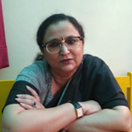
Associate Professor
View Profile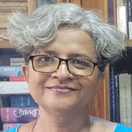
ASSOCIATE PROFESSOR
View Profile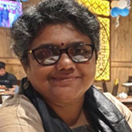
Assistant Professor
View Profile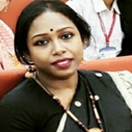
State Aided College Teacher (Category –I)
View Profile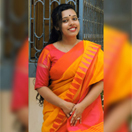
State Aided College Teacher
View Profile| Routine | Download |
| 1 TIME-TABLE 2017-18 | View |
| 2 Time Table 2018-19 | View |
| 3 TIME TABLE EVEN SEMESTER 2019 | View |
| 4 TIME-TABLE ODD SEM 2019 | View |
| 5 TIME-TABLE EVEN SEMESTER 2020 | View |
| 6 TIME-TABLE 2020 ONLINE CLASSES | View |
| 7 TIME TABLE SEM 1 2020-2021 | View |
| 8 TIME TABLE EVEN SEMESTER 2021 | View |
| 9 Time Table Odd Sem 2021 | View |
| 10 TIME TABLE EVEN SEMESTER 2022 | View |
| 11 TIME TABLE 2022 | View |
| 12 TIME-TABLE ODD SEM 2022 | View |
| 13 TIME TABLE EVEN SEMESTER 2023 | View |
| 14 TIMETABLE ODD SEMESTER 2023 | View |
STUDY MATERIAL
| Study Material | Download |
| [Harriet_I._Flower]_The_Cambridge_Companion_to_the Roman Republic(BookFi) | View |
| 9.11 Attacks | View |
| A History of South East Asia by Arthur Cotterell (z-lib.org) | View |
| Abbasi_Economy | View |
| AJANTA CAVES | View |
| Ara Pacis | View |
| Burma Struggle for Independence_Tinker | View |
| Economy Europe_before industrilisation-main | View |
| Fraser Cary 2013 Decolonization and the Cold War | View |
| Harappa | View |
| Hindu Code Bill 1 | View |
| Mesopotamian and Egyptian Pottery | View |
| MUGHAL ARCHITECTURE | View |
| Napoleon biography | View |
| Neighbours of Anc Rome | View |
| Neolithic | View |
| Pallava Architecture | View |
| Policy of British Appeasement 1936-1939_ The Debate between Parliament and | View |
| Renaissance Art | View |
| Renaissance ppt CC6 | View |
| Review essay The 1911 revolution in China | View |
| Slavery 1 | View |
| Slavery 4 | View |
| Slavery | View |
| T.H. Breen Ideology and Nationalism on the Eve of the American Revolution Original Article | View |
| The Art of the Abbasid period | View |
| Tripartite Struggle | View |
| US Hegemony Post Cold War | View |
CONTINUOUS EVALUATION
RKSM VIVEKANANDA VIDYABHAVAN
History Honours Semester 3 CC6 Class Test
Total Marks:12
RKSM VIVEKANANDA VIDYABHAVAN
History Honours Semester 5 CC12 Class Test
Total Marks:12
RKSM VIVEKANANDA VIDYABHAVAN
History Honours SEM 5
FM 50
Time 2 Hrs
Attempt any 4 questions. 12×4
RKSM VIVEKANANDA VIDYABHAVAN
History Honours Sem 5 DSE 1
Class Test FM 12 marks
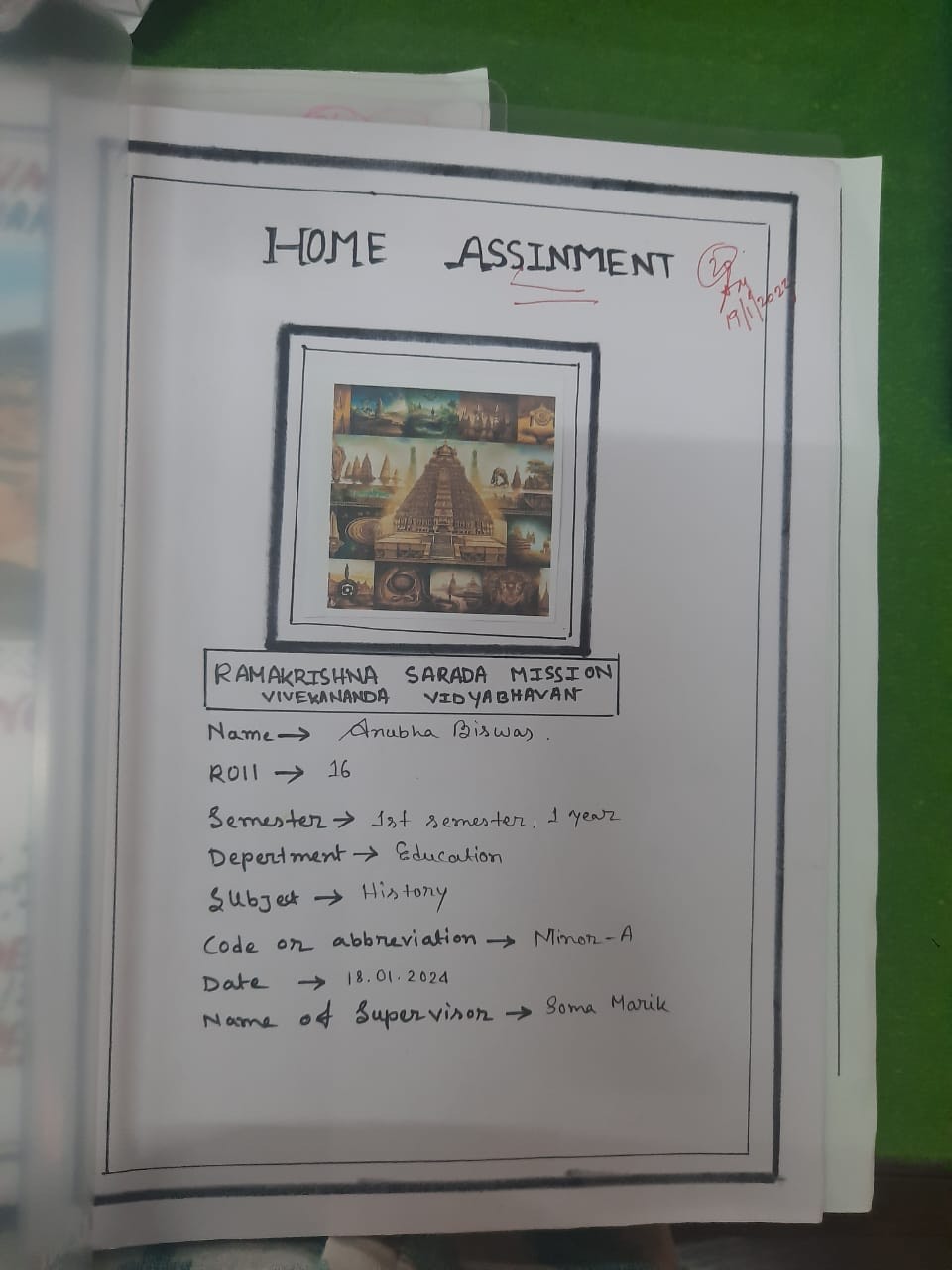
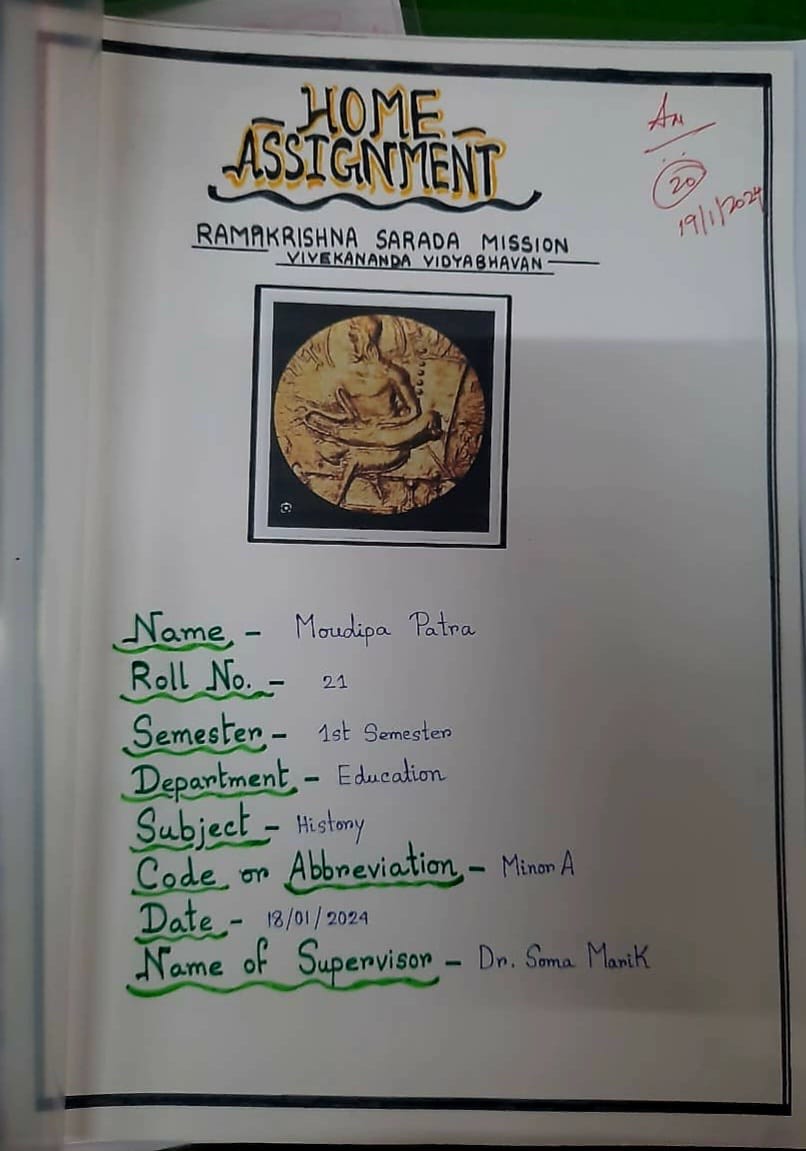
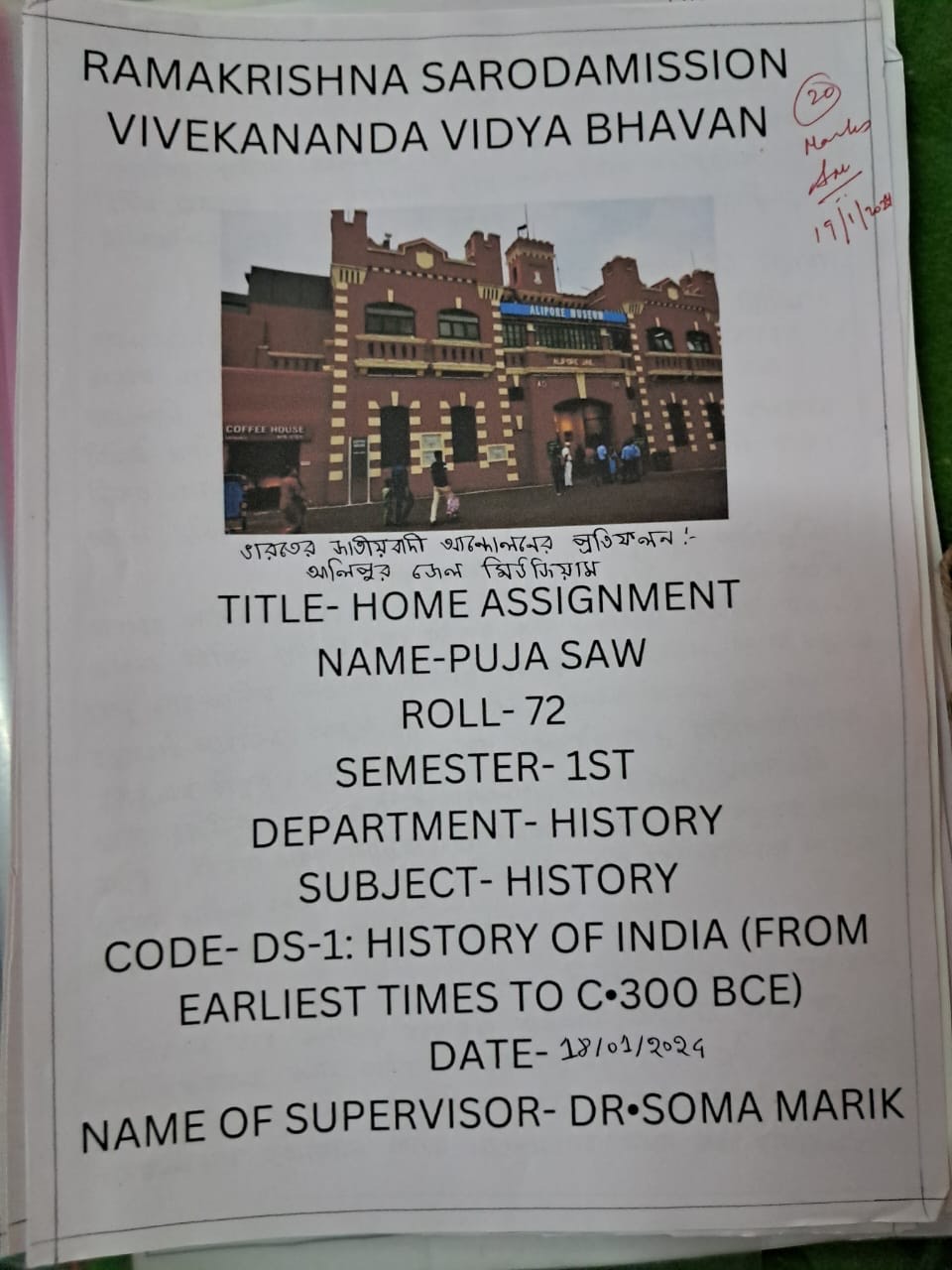
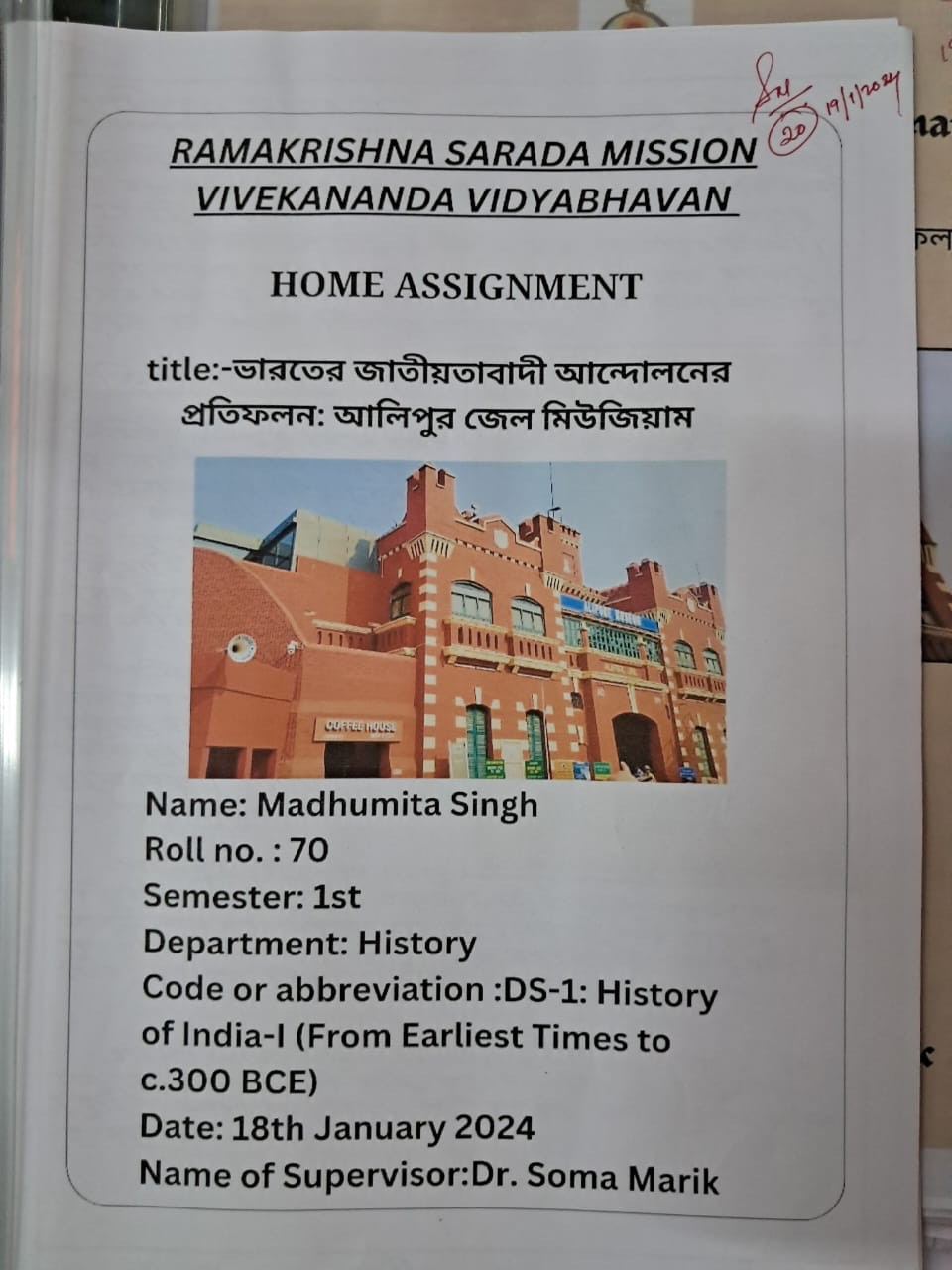
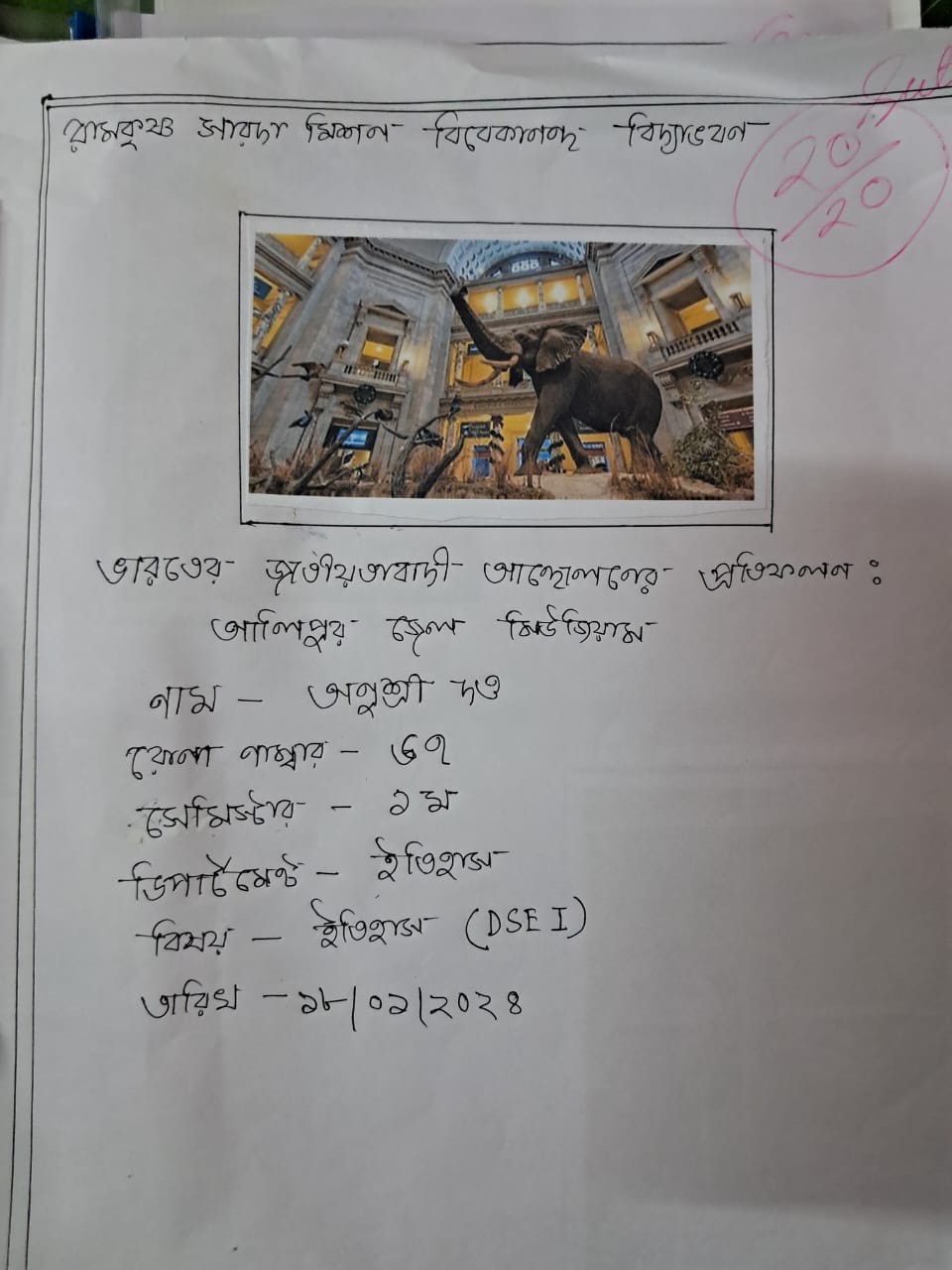
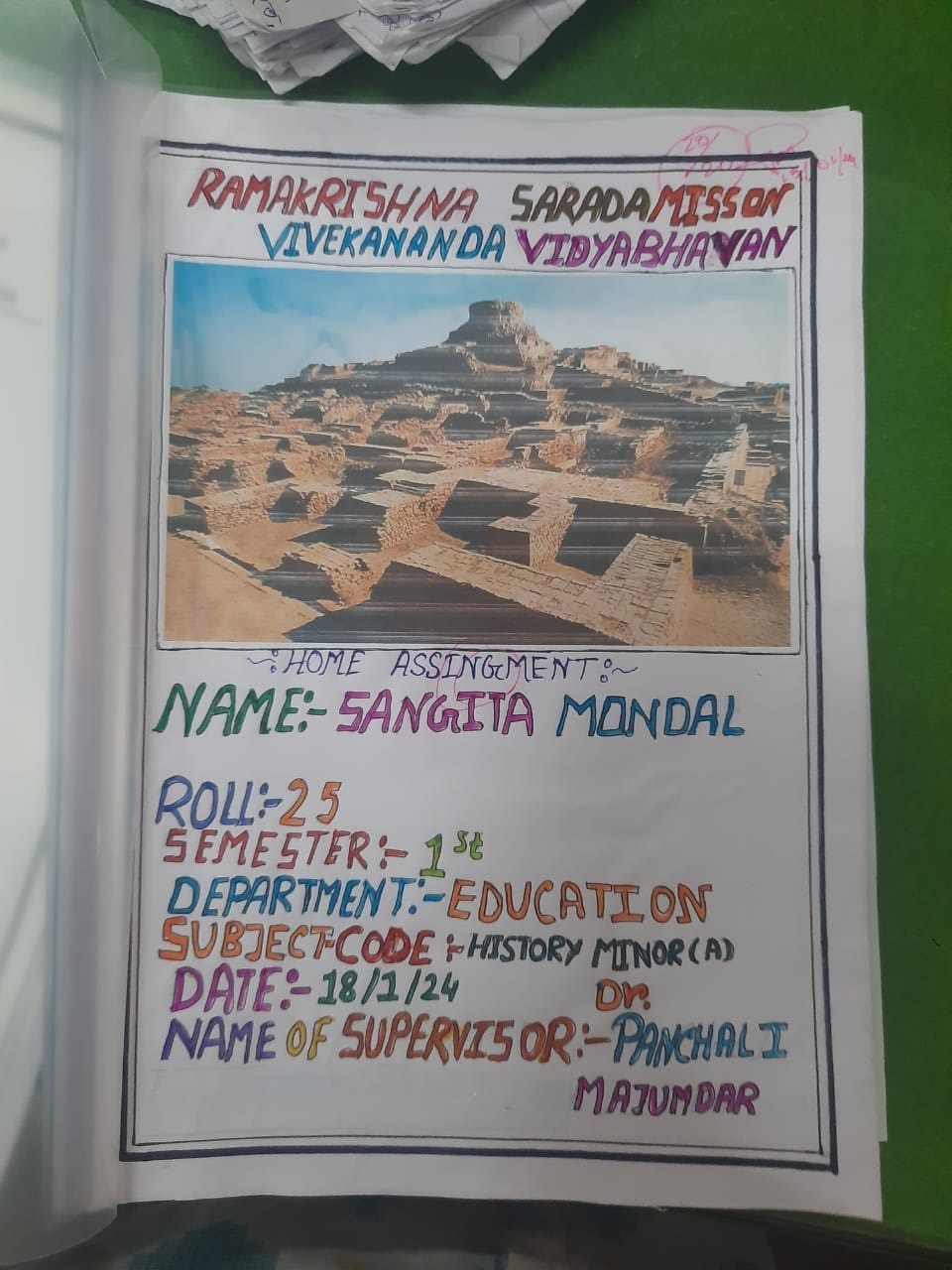
2018-2019
| Sl. No. | Date | Event | Resource Person/s | Title |
| 1. | 10/08/2018 | State-Level Workshop on New CBCS Syllabus | i) Professor Sutapa Chatterjee Sarkar, Department of History, West Bengal State University; ii) Dr. Ritu Mathur, Associate Professor Department of History, Mrinalini Datta Mahavidyapith, North 24 Parganas; iii) Dr Bishnupriya Basak, Department of Archaeology, University of Calcutta; iv)Professor Nupur Dasgupta, Department of History, Jadavpur University; v)Professor Anuradha Roy, Department of History, Jadavpur University; vi)Professor Suchandra Ghosh, Department of Ancient Indian History and Culture, University of Calcutta and Professor vii) Kunal Chattopadhyay, Department of Comparative Literature, Jadavpur University.
|
Aspects of Teaching Early History: From Pre-History to the Decline of Rome
|
| 2. | 16/11/2018 | Extension Lecture | Dr. Sukanya Sarkar, Associate Professor, Department of History, Sarojini Naidu College for Women, Kolkata | Aspects of Mesopotamian Economy |
| 3. | 04/12/2018 | Extension Lecture | Dr. Nandini Bhattacharya, Department of History, Calcutta Girls’ College.
|
Russian Revolution 1917 and the Bolsheviks |
| 4. | 19/03/2019 | Invited Lecture | Professor Sobhanlal Datta Gupta, Former Surendranath Banerjee Professor, Department of Political Science, University of Calcutta | The Indian Left: Promise and Problems |
2019-2020
| Sl. No. | Date | Event | Resource Person | Title |
| 1. | 11/09/2019 | Extension Lecture | Dr. Chirantan Dasgupta, Department of History, Amdanga Jugal Kishor Mahavidyalay, North 24 Parganas | Urban Revolution in Mesopotamia and Features of Urban Economy |
| 2. | 14/11/2019 | Extension Lecture | Professor. Amit Dey, Department of History, University of Calcutta | Trends of Sufism in Medieval India: Differences with Bhakti Movements in Medieval India |
| 3. | 17/12/2019 | Extension Lecture | Dr. Gargi Gangopadhyay, Assistant Professor, Department of English, RKSMVV | Romanticism, Literature and Art
|
| 4. | 07/02/2020 | State Level Seminar | i)Dr. Miratun Nahar, Educationist and Social Activist (retired faculty Victoria Institution);
ii) Professor Sabyasachi Chattopadhyay, Department of History, Kalyani University; iii) Dr. Subhendu Dasmunshi, Associate Professor, Department of Bengali, Sir Gurudas Mahavidyalaya, iv) Professor Shyamal Chakrabarti, Department of Chemistry, University of Calcutta; v) Dr. Rohini Dharmapal, Assistant Professor, Department of Education, RKSMVV; vi) Dr. Sabita Chaudhuri, Associate Professor, Department of Political Science, RKSMVV |
Commemorating the 200th Birth Anniversary of Pandit Ishwar Chandra Vidyasagar
|
| 5. | 17/02/2020 | Extension Lecture | Dr. Debashree Dey, Assistant Professor, Department of History, Maharaja Srishchandra College, Kolkata | Slavery–Slave Mode of Production & Impact on the Economy in the context of Imperial Crisis in Rome
|
| 6. | 24/02/2020 | State Level Seminar | i) Dr. Sukanya Sarkar, Associate Professor of History, Sarojini Naidu College for Women, ii)Dr Sunetra Mitra, Assistant Professor, Department of History, RKSMVV, iii)Dr Chirantan Dasgupta, Assistant Professor, Department of History, Amdanga Jugal Kishore Mahavidyalaya and iv)Professor Nirban Basu, Department of History, University of Calcutta
Two 6th Semester students from each college made presentations |
Hundred Years of Jalliwanwala Bagh: Re-living the Grief |
| 7. | 10/06/2020
|
Webinar | i) Prof. Kunal Chattopadhyay, Department of Comparative Literature, Jadavpur University; ii)Dr. Swati Sen, Department of History, Associate Professor, Dum Dum Motijheel College, North 24 Parganas | Arabic Society, Culture and Science |
2020-2021
| Sl. No. | Date | Event | Resource Person/s | Title |
| 1 | 28/09/2020 | National Level Webinar | i)Professor Sandip Basu Sarbadhikary, Department of History, Viswa Bharati University; ii)Dr Indranil Chattopadhyay, Associate Professor of History, Brahmananda Keshab Chandra College, Kolkata | Nationalist Challenges in Colonial Indonesia and Burma |
| 2. | 08/01/2021 | Online Extension Lecture | Dr. Anwesha Sengupta, Assistant Professor of History, Institute of Development Studies, Kolkata | Partition Dynamics in India
|
| 3. | 09/01/2021 | Multidisciplinary National Online Webinar | i) Dr. Mallarika Sinha Roy, Assistant Professor, Centre for Women’s Studies, School of Social Sciences, JNU;
ii) Dr. Bratati Hore, Associate Professor, Department of History, Surendranath College for Women, Kolkata |
Political Mobilization of Women in Post Independent India |
| 4. | 30/06/2021 | State Level Webinar in Pride Month | i)Tista Das, Founder and Administrator, SRS Solutions, Kolkata; ii) Anurag Maitrayee, Gender and Civil Rights Activist, Kolkata; and iii) Sumi Das, Founder Director, Moitrisanjog Society, Cooch Behar | Pandemic and Us |
2021-2022
| Sl. No. | Date | Event | Resource Person | Title |
| 1. | 08/07/2021 | Online Extension Lecture | Dr. Siddhartha Guha Roy, Department of History, Vivekananda College, Kolkata |
The May Fourth Movement: Origins, Connection with the New Culture Movement in China and Its Significance |
| 2. | 03/01/2022 | Online Extension Lecture | Dr. Smarita Dutta, Assistant Professor, Department of History, Rishi Bankim College, Naihati, 24 Parganas | Thakins and the Shift in the Strategy: Burmese National Movement |
2022-2023
| Sl. No. | Date | Event | Resource Person | Title |
| 1. | 22/09/2022 | Seminar | i)Dr Soma Marik, Associate Professor of History, RKSMVV and, ii) Ms. Aishwarya Banerjee, SACT II, Psychology. | Suicide Prevention and Awareness
|
| 2. | 17 /11/ 2022 | National Level Students’ Seminar in Collaboration with NSOU | i)Dr. Ritu Mathur (Mitra), Associate Professor of History, School of Social Sciences, Netaji Subhas Open University and ii) Ms. Debarati Banerjee, Associate Professor in History, School of Social Sciences, NSOU (Contractual).
13 students/research scholars from Universities and Colleges.
|
M.K. Gandhi: His Ideas on Principles of Social Regeneration and Basic Education
|
| 3. | 13 /12/ 2022 | Invited Lecture | Ms. Mitali Biswas, Member of the National Body, Cinema of Resistance and Civil Rights Activist | Human Rights and Violence on Women |
| 4. | 03/01/2023 | Extension Lecture | Dr. Smarita Dutta, Department of History, Rishi Bankim College, Naihati, 24 Parganas
|
Trends and Developments of the Burmese Nationalism with Special Reference to Communist Movements
|
| 5. | 17/01/2023 | Extension Lecture | Dr. Prasenjit Biswas, Associate Professor, Department of History, Bhairab Ganguly College, Belghoria, North 24 Parganas | Trends in Mesopotamian Bronze Age Economy |
| 6 | 23/02/2023 | Extension Lecture | Dr. Pritha Lahiri, Department of History, APC College, New Barrackpore, North 24 Parganas | Ishwar Chandra Vidyasagar and His Reforms: A Critical Approach |
| 7. | 25/4/2023 | Student Seminar | N/A. Students from both the colleges | 75 Years of Indian Independence: Evolution of Gandhian Strategies in Politics and Social Regeneration |
| 8. | 21/06/2023 | Extension Lecture | Ms. Debashree Bhattacharya, Department of Economics, RKSM Vivekananda Vidyabhavan | Patterns of Tenancy Reforms in Post Independent India with special reference to the Abolition of Zamindary System. |
| 9. | 26/06/2023 | Extension Lecture | Dr. Kakali Mukherjee, Associate Professor, Department of History, Rishi Bankim Chandra College. Naihati, North 24 Parganas.
|
Assessing the Ancient Roman Republican Constitution |
| 10 | 28/06/ 2023
|
Workshop | i)Ms. Minakshi Sanyal, a queer feminist activist and Co-Founder of Sappho Collective and Sappho for Equality; ii) Mx. Koyel Ghosh, a gender non-conforming, non-binary queer feminist activist and Managing Trustee of Sappho for Equality and iii) Ms. Madhurima Ghosh, a lesbian activist and Trustee Board Member of Sappho for Equality | Understanding the Pride Movements: Diverse Expressions of the LGBTIQ Communities
|
Educational Trips/ Visits to Historical Places/Museums
2018 -2019
| Sl. No. | Date | Place/ Places Visited/ Activity | Objective |
| 1. | 11/01/2019
|
Bardhaman: The first destination was Nawab Bari, the palace of Nawab Syed Anwar Berh, a Mughal army commander. However, the influence of Mughal architectural style on the Bengal style is quite evident. The other two places that were visited were the tombs of Sher Afghan, jagirdar of Bardhaman in early 17th century and Qutubuddin, subedar (Governor) of Bengal under Emperor Jahangir. | To train students to appreciate art history and to know about the rich historical traditions of Bengal and the history of the rulers and builders too. The got a glimpse of architectural styles of Medieval Bengal. |
2019 -2020
| Sl. No. | Date | Place/ Places Visited/ Activity | Objective |
| 1. | 16/01/2020 | Dhanyakuria village, a few kilometres from Basirhat North 24 Parganas. The village was one of the influential centres for settlement of zamindars and trading families such as Mandals, Gaines, Sawoos and Ballavas in late 18th century. There are ruins and semi ruins of both traditional residences, mansions and castles. The rasa manchas and the nahabatkhanas stand as evidences of zamindari influence and affluence. These monuments depict both the blending of colonial with Indo-Saracenic styles | To raise awareness of Local History; Art and Culture: Art and Architecture of Late Medieval Bengal. The tour also made the students aware of the pathetic measures of preservation and reconstruction of these historical monuments
|
2020 -2021
| Sl. No. | Date | Place/ Places Visited/ Activity | Objective |
| Nil | Pandemic situation and lockdown |
2021 -2022
| Sl. No. | Date | Place/ Places Visited/ Activity | Objective |
| Nil | Pandemic situation and third wave of Covid |
2022 -2023
| Sl. No. | Date | Place/ Places Visited/ Activity | Objective |
| 1. | 23/12/ 2022 | Debipur, in east Bardhaman District. Debipur is a small village with a few terracotta temples like the Shiva temples, and Dol Mancha. The shiva is a twin temple in the Bengali aat – chala (8 sloped roof) style and depicts rich terracotta decorations. There is also a well-preserved Lakshmi Janardan temple which is a family temple of Singha Deb Rays. This temple reflects rekh deul style, inspired and influenced by the dominant architectural style of the neighbouring state of Orissa | To revisit and learn the art culture and the socio-economic patterns of mid-19th century terracotta architecture. These heritage buildings are nor under the protection of the ASI. |
| Event Reports | Download |
| Events Reports 2018 to 2023 | View |
SLOW AND ADVANCED LEARNERS
Minutes on Formulation of Departmental Policy for Slow and Advanced Learners
September 18th, 2019
dialectics in the growth and shaping of socio-cultural patterns) by asking relevant questions in class
(The policy has yielded results and has hence remained unchanged so far)
Annual Mode
| Year | Appeared | Passed | 1St class | University Ranks
(1st to 10th) |
|
| 2018 | H | 8 | 8 | 1 | 2nd |
| 2019 | H | 10 | 9 | 1 | x |
| 2020 | H | 9 | 9 | 3 | 2nd, 5th, 7th |
Results for CBCS Batch of 2019 – 23
| Sem | Appeared | Passed | SGPA | Number Of Student s | Highest Score & Equivalent
Percentag e |
||
| SGPA | |||||||
| Sem I | 21 | 16 | 4-4.99 | 1 | |||
| 5 – 5.99 | 1 | ||||||
| 6 – 6.99 | 1 | ||||||
| 7 – 7.99 | 8 | ||||||
| 8 – 8.99 | 4 | ||||||
| 9 – 9.99 | 1 | 9.40 | |||||
| 10 | |||||||
| Sem 2 | 27 | 25 | 5 – 5.99 | 2 | |||
| 6 – 6.99 | 6 | ||||||
| 7 – 7.99 | 6 | ||||||
| 8 – 8.99 | 9 | ||||||
| 9 – 9.99 | 2 | 9.10 | |||||
| 10 | |||||||
| Sem 3 | 21 | 19 | 5 – 5.99 | 3 | |||
| 6 – 6.99 | 4 | ||||||
| 7 – 7.99 | 2 | ||||||
| 8 – 8.99 | 9 | ||||||
| 9 – 9.99 | 9.08 | ||||||
| 10 | |||||||
| Sem 4 | 19 | 15 | 5 – 5.99 | 1 | |||
| 6 – 6.99 | |||||||
| 7 – 7.99 | 2 | ||||||
| 8 – 8.99 | 9 | ||||||
| 9 – 9.99 | 3 | 9.23 | |||||
| 10 | |||||||
| Sem 5 | 19 | 14 | 5 – 5.99 | 2 | |||
| 6 – 6.99 |
| 7 – 7.99 | 9 | |||||||
| 8 – 8.99 | 3 | 8.50 | ||||||
| 9 – 9.99 | ||||||||
| 10 | ||||||||
| Appeared | Passed | CGPA | Number Of
Student s |
Percentag e | Number Of Students | Highest Score & Equivalent Percentage | ||
| Sem 6 | 14 | 14 | 5 – 5.99 | X | 50-59% | 2 | Highest score: CGPA: 8.7
Percentage: 72.6% |
|
| 6 – 6.99 | 1 | 60% – 69% | 8 | |||||
| 7 – 7.99 | 4 | 70%- 79% | 4 | |||||
| 8 – 8.99 | 9 | 80% -89% | x | |||||
| 9 – 9.99 | X | 90% –
100% |
x | |||||
| 10 | X | |||||||
| S.
L. NO |
NAME | BATCH | PROGRESSION AFTER BA | EMPLOYER ORGANISATION | POSITION | SALARY |
| 1 | SREYA GHOSH ROY | 2021-22 | HOSPITAL MANAGEMENT
(SNU) |
X | X | X |
| 2 | SRISHTI SHAH | 2021-22 | CS TRAINEE RONAK JHUTHAWAT & COMPANY ; WORKS WITH MEWAR POLYTEX
LIMITED |
X | X | X |
| 3 | SRIPARNA TANTI | 2020-21 | M A (JU ) | X | X | X |
| 4 | SAMPURNA DAS | 2020-21 | M A (WBSU) | X | X | X |
| 5 | SHAONTI
MONDAL |
2020-21 | M A ( CU ) | X | X | X |
| 6 | DEBASREE PAUL | 2020-21 | M A ( CU ) | X | X | X |
| 7 | AMRITA
SAMAJDAR |
2020-21 | M A ( CU ) | X | X | X |
| 8 | ISHITA
CHATTERJEE |
2020-21 | B ED ( CU ) | X | X | X |
| 9 | PUJA MONDAL | 2020-21 | COMPUTER I T
COURSE |
X | X | X |
| 10 | BARNALI PAUL | 2020-21 | PREPARING FOR COMPETITIVE
EXAM |
X | X | X |
| 11 | BARNALI HALDER | 2020-21 | DELHI AIR PORT | GROUND STAFF IN DELHI AIR
PORT |
22600
PM |
|
| 12 | ANNESHWA
MUKHERJEE |
2019 | MA (WBSU) | X | X | X |
| 13 | ANAMIKA
MONDAL |
2019-20 | MA(RBU) | X | X | X |
| 14 | MALABIKA
SAMANTA |
2019-20 | B.ED | X | X | X |
| 15 | MODHUMITA
MONDAL |
2019-20 | MA(WBSU) | X | X | X |
| 16 | NANDITA RISHI
DAS |
2019-20 | MA(WBSU) | X | X | X |
| 17 | NILIMA GAYEN | 2019-20 | MA(WBSU) | X | X | X |
| 18 | PUJA BAIDYA | 2019-20 | MA(WBSU) | X | X | X |
| 19 | RANJITA BERA | 2019-20 | MA(WBSU) | X | X | X |
| 20 | RUPLEKHA BERA | 2019-20 | MA(WBSU) | X | X | X |
| 21 | SANGITA JADAV | 2019-20 | MA(WBSU) | X | X | X |
| 22 | SONALI SUR | 2019-20 | MA(WBSU) | X | X | X |
| 23 | NAMRATA MONDAL | 2018-19 | X | WORKING IN UMA
COMPANY |
FRONT DESK RECEPTIONIST | 15000
PM |
| 24 | RIYA BHATTACHARJEE | 2018-19 | MA(RBU) | GENERAL SECRETARY IN TMCP( NORTH
DUMDUM) |
GENERAL SECRETARY | X |
| 25 | SUSMITA CHOWDHURY | 2018-19 | X | PRIVATE COMPUTER TRAINING
INSTITUTION |
OFFICE ASSISTANT | 20000
PM |
| 26 | JAYASHREE MONDAL | 2018-19 | M A ( WBSU) | X | X | X |
| 27 | TRISHA GUPTA | 2017-18 | M A ( RBU) | R. B.
DIAGONASTICs PRIVATE LIMITED |
X-RAY
TECHNICIAN |
17000
PM |
| 28 | PRIYATA
BALA |
2017-18 | PRIVATE FARM | OFFICE
ASSISTANT |
12000
PM |
|
| 29 | KEYA BARMAN | 2017-18 | M A (CU ) & B
ED (CU ) |
X | X | X |
| Students’ Section | Download |
| Students’ Section | View |
University Rank Holders
Best Performers at a glance
Batch of 2020-23
Batch of 2019-22
***Ankana Majumdar deserves special mention as she surmounted immense physical and mental challenge to complete her studies and perform so well in the examination. She has broad spectrum disorder along with motor disability.
Batch of 2018-21
Batch of 2017-20
Batch of 2016-19
Awards and Recognitions won by students of our department
| Name of Student
|
Award/ Recognition within College
|
Award/ Recognition outside College |
| Prithi Maity | Pravrajika Mokshaprana Memorial Scholarship (27.05.2023) | x |
| Indrani Das Mahapatra | 1st prize in Online Slogan Writing Competition (English) organized by NSS Unit of RKSMVV. (8.06.2022)
2nd prize at the Visual Symphony Photography competition at Revelio 2023 on10th April,2023 organized by the Department of English, RKSMVV 2nd place in Extempore Speech competition of Srijani, the Annual Cultural Competitions of R.K.S.M.V.V (27.05.2023) 3rd prize at Mobile Photography competition, Srijani, |
|
| Medha Kundu | x | Awarded one of the best speakers in the Day Long State Level Seminar on “Women’s Movements, Histories and Narratives: Revisiting the Journey” |
| Shreya Ghosh roy | 1st in Photography competition
3rd in Rabindra Nritya |
|
| Madhumita Roy | 3rd in Alpona, Srijani | |
| Manisha Naskar | Purnima Roy Memorial Prize | |
| Sangita Bera | 1st in Value Education
2nd prize in Creative Dance Competition, Srijani |
|
| Anamika Mandol | Pravrajika muktiprana Memorial Scholarship
Mahendralal Sircar Memorial Prize Sarojini Ganguly Memorial Prize |
|
| Madhumita Mandal | Champion of Champions (sports) | |
| Anisha Gupta | 1st in College Poster Competition
2nd in Extempore Competition |
|
| Ayantika Pradhan | 1st prize in Sanskrit Recitation | |
| Rina Biswas | 1st in Modern Music | |
| Marufa khatun | 2nd in painting competition | |
| Sreya Goswami | 3rd prize at Mobile Photography competition, Srijani | |
| Maitrayee Sarkar | Mahendralal Sircar Memorial Prize
Sarojini Ganguly Memorial Prize |
|
| Malabika Samanta | Special Award for Shrine Work | |
| Shaonti Mandal | Special Award – lead vocalist | |
| Sriparna Tanti | 1st in Value Education | |
| Jayasree Mandol | Mahendralal Sircar Memorial Prize
Sarojini Ganguly Memorial Prize |
|
| Pradipta Saha | Special Prize for Good conduct
Professor Tripti Choudhury Memorial Prize |
EMPLOYMENT PROFILE:
| Suchanda De (Entrepreneur in the making, owns a boutique, completed a diploma course in Textile designing, completed Master’s degree) | |
 |
I am a proud student of Vidyabhavan- the institution that helped me evolve into the individual I now am. From being a shy teenager, Vidyabhavan moulded me to be a confident young woman ready to take on the challenges of the outside world. I learned to value the significance of the 3Ds- discipline, dedication and determination at Vidyabhavan only. It was in college that I realized how important it is to be confident about oneself, to be selfless and honest. These qualities and the constant encouragement I received from my teachers helped me to be a stronger and better individual, allowed me to pursue my chosen profession. |
| Anindita Bhowmick, Currently Assistant Supervisor | |
 |
Anindita Bhowmick, currently Assistant Supervisor, Air India Engineering Service is one of the ex-students of History department. She later completed her Masters and MPhil from University of Calcutta. A proud alumnus, Anindita strongly feels that the values and life skills she acquired here in the course of her five year stay in the college shaped her outlook towards life, imbued in her such moral ethical standards that they became yardsticks for others to emulate. She cherishes the good conduct certificate she received from the college during the parting days as a feather in the cap amongst her other accolades. Anindita recalls how she was coaxed by one of her departmental teachers Dr Soma Marik to participate in the Recitation and Extempore Competition , overcoming her shyness and some form of stage fright. But when she received the second prize for the event, it became a catalyst for her future endeavours in college. She fondly recalls her association with Bidyutdi our erstwhile monastic teacher who would really at a loss arranging gifts for her. Anindita got the highest marks in History at the Higher Secondary level and her receiving the prize from Vice Chancellor of Calcutta university made her resolve firmer to study History at the undergraduate level. Anindita proudly says that during her job interview, she received special recognition as she was a student of this college. Anindita says that she had received the elementary computer training that was needed for her new assignment from her alma mater. |
| MaitrayeeSarkar (SACT teacher at Department of history RKSMVV) | |
 |
Maitrayee Sarkar, M.A, B.ED, M.Phil, State Aided College Teacher, Ramakrishna Sarada Mission Vivekananda Vidyabhavan. My association with my beloved college dates back years ago when I enrolled myself as a student of History Honours. Little did I know then that along with curricular subjects I would receive training in acquiring knowledge to be devoted and ready to sacrifice for the greater good. In our college soft skill development got special attention and thus we learned to love everyone around us unconditionally. We were empowered with basic life skills like emotion, affection and, sincerity. I still remember my respected teachers who not only taught us but inspired us to take up challenges. I am proud of my college and teachers. I shall be ever grateful to them for their constant guidance and encouragement in my life. |
| Writosree Mukherjee Subject matter expert, WIPRO Limited Hyderabad | |
 |
The formative years of my life at Vidyabhavan is unforgettable. I was very nervous when I got admitted. But all my doubts were cleared when classes started. I was an average student. I found great happiness in dancing and singing more than studies. I still remember how my teachers and Mataji used to encourage me to pursue singing and dancing along with the studies. I feel so indebted to them for their cooperation and guidance. It’s been 11 years since I passed out, but the phenomenal life lessons which Vidyabhavan has taught me, has shaped my life. Today whatever I am, my college has an important part to play in it. I shall never be able to thank my college enough. |
| Pradipta Saha Modak | |
 |
Academic Counsellor at Carreograph Institute of Management Studies is an ex-student of the Department. Pradipta was a bright student and a fantastic dancer. We are glad that Pradipta is doing so well at the professional level. |
| Medha Kundu | |
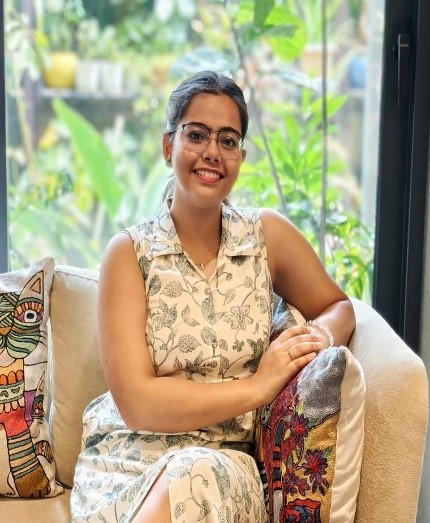 |
Medha Kundu passed out in 2023 as an honours student. One of the most promising students of her batch Medha did not pursue academics but has been working in Carbon Resources Private Limited as Assistant- HR Admin and Social Media Management. She is currently pursuing MBA-HRM from IGNOU for distance learning. Medha joined college in the midst of the pandemic and she recalls how serious they were about the online classes that were held. The last two semesters she spent in college saw her engaged in various activities as part of the NSS and other cocurricular work. |
| Indrani Das Mahapatra | |
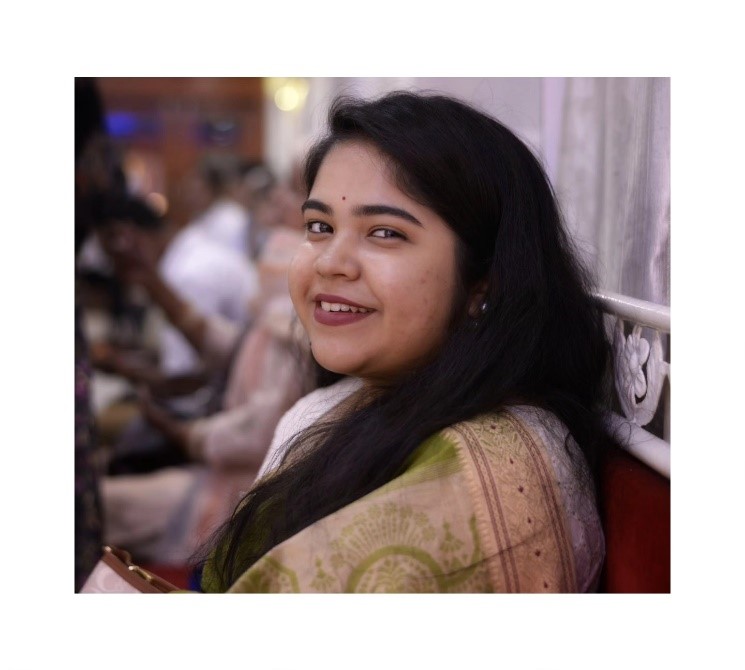 |
Indrani Das Mahapatra is an ex – student of Ramakrishna Sarada Mission Vivekananda Vidyabhavan (2020- 23 Batch). She is currently pursuing a Master’s degree In Film Studies at Jadavpur University. Alongside she is a teacher at Eduinfinitum Academy.
Her creative side thrives on Theatre, and she is a General Body Member of Ankur Natyadal Kolkata where she participated in several theatre productions. She is a voice-over artist and recently received an award for my Voice acting on different platforms. |